This week I got to travel all the way to Borneo. It was very hot, but extremely beautiful.
I came in search of a "forest man," which has the strength of five men and can grow to the
size of a full-grown man, but is surprisingly gentle.
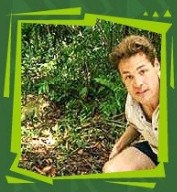
To find the "gentle giants" I had to trek into the primary rain forest, which has never been
cut down. In fact, much of the area I was in, Bako National Park, remains unexplored. It
was only a few decades ago that headhunters were still wandering around in it!
As I was travelling downriver, I spotted some long-tailed macaques.
Those long-tailed macaques were precocious! They were real quick to come over -- especially
to take food. If you hold back food from them, they will attack! Remember when you're
working with monkeys, the protocol is not to make eye contact, because they will take it
as a sign of aggression!
As I continued into the rainforest, I came across some rotting palms. Inside the palms
were sago worms, a great source of protein. I put them in a container to save for dinner
later on.
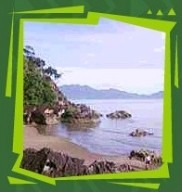
A few hours had passed, and I found myself walking through the mangrove at low tide.
The river had receded and uncovered some diamorphic fiddler crabs. Diamorphic means
you can tell an animal's gender just by looking at it. The female fiddlers have two small
front claws, while the males have one oversized claw they use for territorial battles.
The sago worms tasted greasy! They eat palm leaves, which are saturated with oil. The
taste lingered for a long time! When I bit into them they just burst. It was pretty
gross. I didn't really like the taste, but they are very nutritious. If I were stuck
out in the wild, I would definitly eat them again.
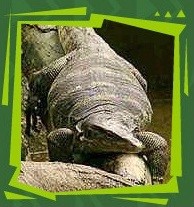
I moved further inland and came across a Malaysian water monitor. These animals can live
in water, on land, and even in treetops! They are excellent hunters, eating reptiles, birds,
fish, and sometimes carrion. They share two qualities with snakes: forked tongues and the
ability to swallow their prey whole.
These wonderful creatures were very gracious. It was amazing to watch them climb. They
are really fast. During filming it was just so hot, and they made it a bit uncomfortable,
but I was really glad to observe the water monitors in action.
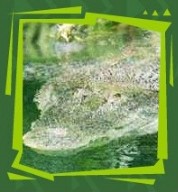
As I contiunued on, I came close to where an estuarine crocodile was lying in wait. He was
18 feet long (six meters) and weighed about 215 pounds. Don't be fooled by his weight; this
croc could have easily jumped out of the water and made a meal of me. Remember to stay as
far away from these man-eaters as possible!
This croc was not bothered by us at all. He saw us as no threat -- easy prey. I stayed
far away from the water -- on false move and that would've been it!
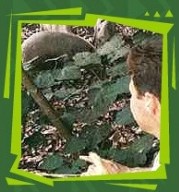
I decided to move back inland a bit! I found some torn-up ground and knew some bearded
pigs weren't far away. These wonderful creatures get their name from the tufts of hair
surrounding the sides of their mouths. They have an excellent sense of smell, which they
use to find food in the ground. These pigs can form a one-way relationship with a group
of macaques -- eating the macaques' leftovers as they fall to the ground. I set up camp
for the night. Then it was time for those sago worms. I fried them in banana leaves.
After I ate it was time for bed.
Bearded pigs are not dangerous to man. They use their tusks to protect themselves and
dig into the ground for food. As soon as they felt we were too close, they took off.
The next morning I set out to find these wonderful "forest men," or as they are more
commonly known, orangutans. They are the only examples of Great Apes in Southeast Asia
(they are found only in Borneo and Sumatra). They live in the treetops. These special
creatures get their water from ferns that have collected water during rainfalls. They take
the long hair on their arms, soak it in the water, and take a drink!
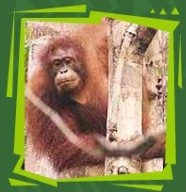
At a very young age orangutans can recognize over 200 plants they can eat. Mothers are
devoted to their offspring. Baby orangutans have been known to cling to their mothers
for up to two and a half years.
Whereas these "gentle giants" had a population of 100,000 twenty years ago, they are now
down to 25,000, and if we don't take steps to protect them, they will be extinct in another
15 to 20 years.
The orangutans were truly beautiful. It was very exciting to see the mothers with the
babies. Borneo itself was very hot and sweaty, but seeing all the orangutans made it all
worthwhile!
I spent the rest of the day watching these wonderful creatures and hope to get back to
Borneo to watch them again. Join me next time as I search the Badlands of South Dakota.
Stay Wild!
Jeff
Back to the Journal Page